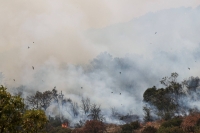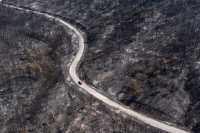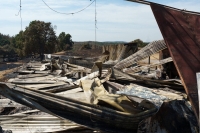A wildfire burning in northeastern Greece for 11 days has destroyed an area larger than New York City, the European Union-backed Copernicus Climate Change Service said Tuesday, as firefighters from five countries battled to contain the flames.
Fueled by gale force winds and hot weather, the fire that began near the city of Alexandroupolis quickly spread across the Evros region, killing at least 20 people last week in Europe's deadliest blaze this summer. It has turned lush greenery into scorched earth and destroyed homes and livelihoods.
In a post on social media platform X, formerly known as Twitter, the Copernicus Emergency Management Service said the fire had ravaged at least 808.7 square kilometers. New York City takes up 778.2 square kilometers.
Copernicus said last week the fire was the largest on European soil in years, and authorities said the fire was still highly dangerous.
Aircraft and hundreds of firefighters on the ground, including from Albania, Serbia, Slovakia and the Czech Republic, were battling the flames, the fire brigade said.
"We are trying to defend the rest of the unaffected area before the front line of the fire comes," said Jiri Nemcik, commander of the Czech team. "The development of the fire is very dynamic so it's very dangerous."
Satellite images highlight the extent of the destruction in the area where lush pine trees have been reduced to blackened, skeletal bark.
Panagiota Maragou, head of conservation at the Greece division of the World Wildlife Fund (WWF), said at least 30% of the National Park of Dadia-Lefkimi-Soufli Forest had been lost.
Because of its high biodiversity, the national park was "one of the most important protected areas in Greece and also in Europe, perhaps also on an international scale," she said.
Prime Minister Kyriakos Mitsotakis chaired a meeting Tuesday on the fires that have ravaged Greece, touching on preventative measures among other issues, a statement from his office said.
Environmentalists have long accused Greece of spending more funds on extinguishing fires than on prevention.
"We've seen in the case of Dadia and in the case of the Evros fire in general ... one of the biggest fires in Europe, that a system that relies exclusively on suppression of fires is not working," Maragou said.
Summer wildfires are common in Greece but the government says extreme weather conditions that scientists link to climate change have made them worse this year. Greece's deadliest fire on record killed 104 people outside Athens in 2018.
All but one of the dead in the Evros fire are believed to have been irregular migrants who crossed over from Turkey, evading police in the forest. Authorities fear more bodies may be found when the flames are put out, as Evros is a popular crossing into the EU for thousands of migrants and refugees every year.
The fires have spurred anti-immigrant sentiment in the region, according to Greece's Racist Violence Recording Network.
Last week, police detained three men after a video emerged on social media showing migrants in a trailer pulled by a jeep, and a man heard urging civilians to "round up" migrants he accused of setting the fires.
On Tuesday, a prosecutor launched a preliminary investigation into a separate incident after another video posted on social media showed four men, believed to be migrants, sitting on a dirt track beside a jeep, and a local man filming them, according to an official at the citizens' protection ministry.
The official said the man, who appeared at the Alexandroupolis police headquarters, had been wanted for his alleged involvement in the "forcible immobilization" of migrants.






















With your current subscription plan you can comment on stories. However, before writing your first comment, please create a display name in the Profile section of your subscriber account page.